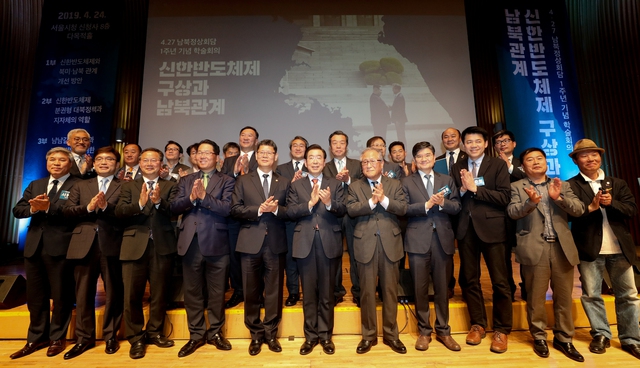 |
|
Minister of Unification Kim Yeon-chul (front row, fifth from left) at an event called, “April 27 Inter-Korean Summit First Anniversary Academic Conference: The New Korean Peninsula Vision and Inter-Korean Relations,” at Seoul City Hall on Apr. 24. To the right of Kim is Seoul Mayor Park Won-soon and Former Unification Minister Jeong Se-hyun, chair of the Hankyoreh Unification and Culture Foundation and the Korea Peace Forum. (Kim Jung-hyo, staff photographer)
|
Participants discuss vision for “joint security” beginning with 2032 Summer Olympics
A vision for inter-Korean “joint security” beginning with the 2032 Summer Olympics, which South and North Korea are pushing to co-host, was presented at a recent academic conference. The concept amounted to a commentary aimed at filling in the specifics of the “new Korean Peninsula system” proposed by South Korean President Moon Jae-in as a “national vision for the next 100 years of the Korean Peninsula” during a commemorative address this year for the March 1 holiday. The outline came in a presentation titled, “New Korean Peninsula System: Vision and Prospects,” delivered by Lee Jung-chul, professor at Soongsil University, at an event called, “April 27 Inter-Korean Summit First Anniversary Academic Conference: The New Korean Peninsula Vision and Inter-Korean Relations.” It was at Seoul City Hall in Seoul’s Jung (Central) district on the afternoon of Apr. 24. In the Pyongyang Joint Declaration from their summit last September, the South and North Korean leaders agreed to work on a joint bid for the 2032 Summer Olympics. Lee Jung-chul identified two main stages to the new Korean Peninsula system. The first period, extending through 2032, would involve completing a political confederation through a process of inter-Korean economic cooperation. The second stage, coming after 2032, could be defined as representing the actual “new Korean Peninsula” system as the two sides proceed toward joint security as well. Lee identified the significance of the new Korean Peninsula system as tying together the different policies presented since the Moon administration’s launch (the new southern policy, new northern policy, and new Korean Peninsula economic vision) into a single unified framework and stating a commitment to the Korean peninsula establishing their own order over the next century. According to Lee, the progress achieved in inter-Korean relations last year brought about changes to the Northeast Asian and East Asian systems of representation by shifting from an antagonistic regime of division on the Korean Peninsula to one of peaceful coexistence. Progress in North Korea’s establishment of itself as a “normal” state, combined with the rise of China, signifies an end to the system of Japanese overrepresentation, he explained. At the same time, he also shared concerns about potential challenges to the new Korean Peninsula system, namely the US-China competition for hegemony, Japan’s transformation into a “global ordinary power,” and the possibility of North Korea remaining a “rogue state.” Kim Dong-yub, professor at the Kyungnam University Institute for Far Eastern Studies, stressed the need for greater clarity in the “new Korean Peninsula system” concept. “The concept of the new Korean Peninsula system has already been set in motion since the leaders of South and North Korea agreed in Pyongyang last September on measures to reduce military tensions,” he concluded. Addressing fears that peace might evaporate mid protracted NK-US negotiations Former Unification Minister Jeong Se-hyun, who currently chairs the Hankyoreh Unification and Culture Foundation and the Korea Peace Forum, noted in an opening address that “the impasse in North Korea-US relations has some concerned that peace on the Korean Peninsula might evaporate.” “The embers of North Korea-US negotiations will be revived through the proactive efforts of President Moon Jae-in, and inter-Korean relations will become re-energized,” he predicted. A celebratory address was given by Minister of Unification Kim Yeon-chul, who noted that US President Donald Trump and North Korean leader Kim Jong-un “both recently expressed their commitment to holding a third North Korea-US summit.” “The three parties – South and North Korea and the US – have taken a new step toward renewed progress from resolving the North Korean nuclear issue and establishing peace on the Korean Peninsula,” he said. In a welcoming address, Seoul Mayor Park Won-soon stressed, “One of the things that is truly needed right now is the active pursuit of emergency humanitarian aid in areas such as food, public health, and healthcare for the lives and health of North Korean children.” He went on to say that the city of Seoul would work on considering ways of providing humanitarian support to the North. By Kwon Hyuk-chul, director of the Hankyoreh Peace Institute Please direct comments or questions to [english@hani.co.kr]






